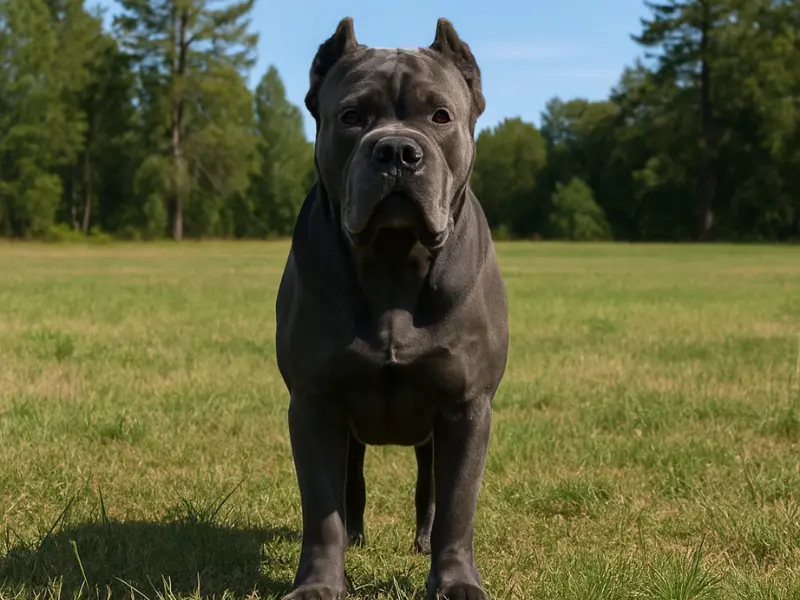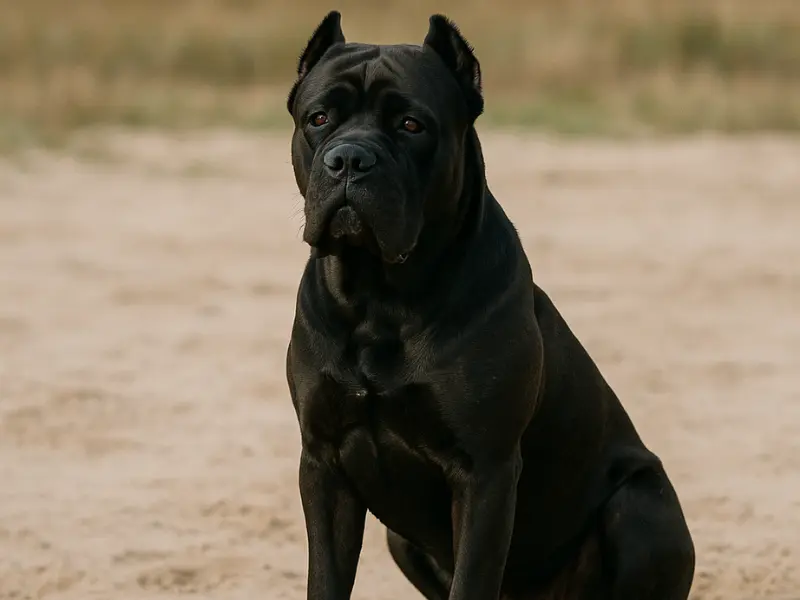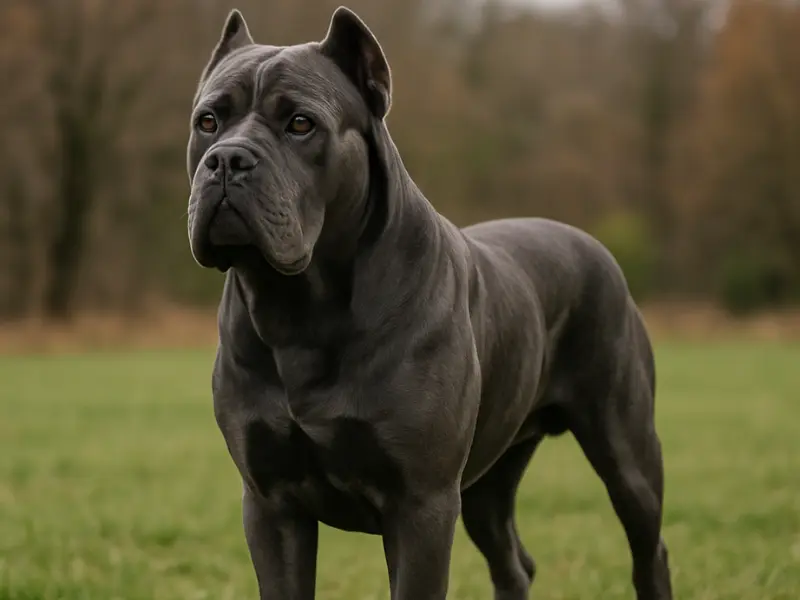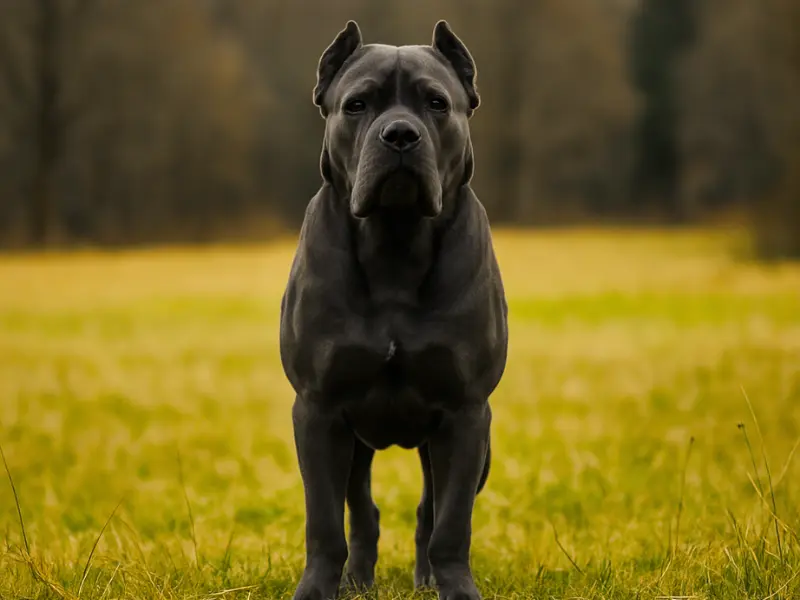If you seek a large, powerful, loyal dog who will always have your back, the Cane Corso is for you. This is your ideal breed. This powerful but loving dog, originally from ancient Rome, has become quite popular among experienced dog lovers. Let’s be honest, though: owning a Cane Corso requires much accountability that calls for patience, commitment, and enough training.
Here, the Cane Corso will be covered regarding its history, personality, care requirements, health issues, food, and adoption or purchasing tips. Whether you are considering getting a Cane Corso or just curious about this gorgeous breed, you will find all the basic facts here.

Quick Overview of the Cane Corso
- Group: Working
- Origin: Italy
- Height: 23.5 to 27.5 inches
- Weight: 80 to 120 pounds
- Coat: Short, dense, and coarse
- Colors: Black, gray, fawn, red, brindle (all with possible black/gray mask or white patches)
- Life Span: 10 to 12 years
- Temperament: Protective, calm, loyal, reserved
- Good with Kids: With supervision
- Good with Pets: With early socialization
- Energy Level: Medium to high
- Exercise Needs: High
- Hypoallergenic: No
History of the Cane Corso
The Cane Corso’s lineage can be traced to Molossers, war dogs from ancient Rome, originally bred for tasks like guarding, hunting, and fighting. during the near extinction during World Wars I and II, Italian initiatives in the 1970s helped to bring this dog breed back to life. First seen in the United States in the late 1980s, Cane Corsos. These days, they are prized as devoted family members as well as protection dogs.
What Does a Cane Corso Look Like?
Often leading outsiders to avoid them, the remarkable Cane Corso breed has a robust, muscular form and a stern expression. Their short coat may be black, gray, fawn, red, or brindle; they may also have black or gray masks and faint white markings. Though these customs are contentious and illegal in some nations, many Cane Corsos have their ears cut and tails reduced.
Cane Corso Personality and Temperament
Renowned for intimate relationships with his family and loved ones, the Cane Corso is a powerful, devoted, and clever dog. Though they are territorial and wary of strangers, they make ideal guard dogs; they just need early socialization.
Key Traits:
Loyal: Forms strong emotional bonds with family
Protective: Will guard home and loved ones
Reserved: Not overly friendly to strangers
Calm: Generally quiet indoors if properly exercised
Smart: Learns quickly and enjoys training
Are They Good with Kids?
Large dogs can inadvertently hurt tiny children, hence, interaction with them requires close observation. Children should be taught appropriate conduct around large dogs and to always have an adult present for their interactions.
What About Other Pets?
Regular socialization from an early age ensures Cane Corsos live peacefully with other animals. Remember, though, they have a strong hunting drive and, without adequate training, they might hunt smaller creatures.
Training a Cane Corso: Start Early
Training should begin the moment you bring your Cane Corso puppy home. These dogs are highly trainable and eager to please, but they can be strong-willed. A firm, patient, and consistent training approach works best.
Tips for Training:
Use positive reinforcement (treats, praise, playtime)
Avoid harsh punishment—it can lead to fear-based aggression
This dog is Social with people, other dogs, and new environments
Enroll in puppy obedience classes
Practice leash training early to prevent pulling
Training isn’t just about commands—it’s about setting boundaries, building trust, and helping your dog grow into a balanced adult.
Exercise Needs: A Tired Cane Corso Is a Happy
Natural working dogs, cane Corsos, need consistent physical exercise to stay both physically and emotionally healthy. A lack of exercise can result in frustration, causing unwanted behaviors like digging and chewing. Daily, they should preferably spend 30 to 60 minutes on walks, running, or playtime in a safe yard. Furthermore, very important is cerebral stimulation, which comes from interactive games, obedience training, and puzzle toys. For exercise and bonding, owners can also include dogs in agility or advanced obedience. Young puppies should be watched closely, though, since over-exercising or contact with hard surfaces could cause joint problems. The right exercise is required during their developmental stages.

Grooming and Coat Care
Grooming a Cane Corso rather easily compares favorably against long-haired canines needing regular brushing and trimming pretty frequently. Shedding occurs more clearly in spring when their winter coat is lost. These dogs have a short, thick coat not need extensive grooming. Brushing with a soft-bristle or rubber grooming brush once or twice weekly preserves coat health and controls shedding pretty well.
More frequent brushing during intense shedding periods aids in managing loose hair around the house quite effectively. Bathing is required just when they get soiled or start smelling like a wet dog. Overbathing removes natural oils from their coats, so it should be done infrequently. Coat care involves periodically examining and cleaning their ears softly with a vet-recommended cleaner. Moisture and debris accumulation can make Cane Corso susceptible to painful ear infections. Nail clipping is another important part of their grooming regimen.
If outside activity doesn’t naturally wear down their nails, you must cut them every several weeks. This dog’s nails, if left too long, can result in paw problems and distress. Oral hygiene is also critical and involves brushing twice or three times weekly. This helps avoid poor breath, dental illness, and tartar buildup effectively. Early introduction to nail trimming, ear washing, and brushing is key to stress-free grooming for both you and your Cane Corso.
Common Health Problems in Cane Corsos
Good Cane Corso breeders are dedicated to maintaining the breed’s health and clarity. To ensure that every litter possesses the best possible breed character, they adhere to a demanding strategy set by organizations like the American Kennel Club (AKC). Regular health checks on their breeding dogs are part of this responsibility for checking inherited medical conditions. If you plan to bring home a Cane Corso puppy, always ask for papers showing the parents were tested for these often occurring health problems. Making sure you are getting a well-bred, healthy dog starts with this crucial first step.
Cane Corsos can nevertheless be prone to particular inherited health problems like all purebred dogs, even with the attention breeders give. Some of the following circumstances ought to be mindful of:
Hip Dysplasia: This hereditary condition causes arthritis, pain, and limited mobility since it stops the hip joint from growing completely. This condition especially affects larger breeds like the Cane Corso; consequently, it is essential to verify that breeding dogs have been checked for it.
Gastric Dilatation-Volvulus (Bloat): If your dog eats or drinks too fast, gas can fill their stomach and twist, leading to a fatal disease. Twisted stomach prevents blood flow, hence producing a rapid and serious medical catastrophe. This condition is fairly frequent among large and deep-chested breeds; Cane Corsos are not exempt.
Ectropion: This refers to a condition whereby the eyelids turn inward, aggravating the eye’s surface with the lashes. It may damage the cornea over time and be painful. While any dog can contract this disease, it is more frequently observed in giant or enormous breeds like the Cane Corso.
Seizure Disorders: Owners should be careful of idiopathic epilepsy, a neurological illness causing unprovoked seizures, according to the Cane Corso Association of America. Though their parents seemed to be in great shape, Cane Corsos could be affected by this type of epilepsy between two and five years old.
Review every potential health concern with the breeder before deciding on purchasing a Cane Corso; request health testing evidence. Choosing a dog from an ethically sensitive, health-conscious breeder lowers your future risk of serious genetic health problems considerably.
Feeding of this dog and Nutrition
If you feed a Cane Corso is especially harsh during their puppyhood for quick growth, muscles, and general health. Because these dogs mature rapidly and have an inexhaustible appetite, their food has to be rigorously controlled to prevent problems, notably with their bones and joints. Young they have to be fed a top premium puppy diet developed only for enormous breeds. Without overpacking their expanding bodies, this kind of meal gives them the ideal combination of vitamins. Overfeeding or adding calcium supplements alone can be dangerous; hence, it is best to follow a well-balanced puppy diet and three to four small meals daily while they are still growing.
Two meals a day are most appropriate right now. Apart from bettering digestion, this lowers the chance of gastric bloating, a severe condition that large dogs might be vulnerable to. Find dog food with genuine meat as the first ingredient that offers complete and balanced nutrition. Stay away from grain-free diets unless your vet expressly advises otherwise, as they have been connected to several heart issues in dogs. Make sure fresh water is always available and control rewards to help your Cane Corso keep a correct weight throughout their life.
If you are thinking about adopting or buying a Cane Corso
It is difficult to do your work carefully and get some rest if you’re thinking about adopting a Cane Corso into your household before you commit. Not everyone should have this breed; without enough preparation and knowledge, events can soon spiral out of control. Whether you decide to purchase or embrace, be certain your choice is driven by thorough thinking and complete knowledge of what owning a Cane Corso involves.

Adoption
Many Cane Corsos are transformed into shelters or rescue groups as their prior owners underappreciated the degree of responsibility needed. Adopting is a fantastic way to provide one of these dogs with another chance at a happy life. Focus on rescuing Cane Corsos that come from several famous groups.
including Big Dogs Huge Paws, Cane Corso Rescue, Inc., and other local shelters or rescue groups. Generally, less than purchasing from a breeder, adoption fees often include basic services such as microchipping, spay/neuter surgery, and immunizations. If you’re ready to take on an adult dog or one who might need some therapy, this can be a very fulfilling approach.
Buying from a Breeder
Finding a good breeder is crucial if you wish to have a dog, but adoption is not the best choice for you. A well-bred Cane Corso can run anywhere from $1,500 to $5,000, depending on the genetics, breeder’s reputation, and displaying potential. Although this price tag suggests some comfort, ethical breeders spend time and money producing a well-socialized, healthy dog.
Ask a few quite crucial questions of the breeder before you purchase. To make sure both parents have been tested for common breed-related disorders, including hip dysplasia and heart issues, ask to view their health screening records. Also, probe the puppy’s background. They should ideally be grown in a household where they are constantly seen and surrounded by the sights and noises of the house. After the sale, be easily reachable and offer a health assurance.
Avoid backyard breeders, puppy mills, or shady online ads that sell dogs at incredibly low prices. Putting profit before the well-being of the dogs, these sources can sometimes lead to disastrous problems years later. When it comes to finding your Cane Corso, patience and diligence will ensure that you start your journey on the right note.
Is a Cane Corso Right for You?
Welcoming a Cane Corso indoors your home is not amazing to be taken lightly. For those who genuinely grasp what they are getting into, these powerful, smart canines make ideal pals. Cane Corsos need a particular kind of house and lifestyle to flourish despite their several amazing qualities. Among the primary advantages of having one is its great loyalty. Being instinctively protective, they form strong bonds with their families and make excellent observers. Particularly if you enjoy teaching new commands or engaging in structured activities,
Their quick minds and minimal maintenance requirements make them easy to care for physically and fun to teach. Still, not everyone finds this kind of breed suitable. First-time dog owners could struggle with the temperament of Cane Corsos. Considering their toughness, confidence, and protective instincts, they have to have someone who can provide ongoing mentoring and direction. They could exhibit behavioral issues, including territorial behavior or aggression if not properly socialized and oriented early on. These dogs require guidance and cannot learn independently
Financial demands go hand in hand with the mental and physical work needed for a Cane Corso. From high-end cuisine to routine veterinary appointments, training courses, and sturdy, long-lasting equipment, costs may quickly mount up. This is not a low-maintenance dog; one that would thrive with limited care.
Cane Corsos thrive in residences with a well-informed, confident owner, ready to spend time on daily routines, physical activity, and regular training. A Cane Corso might fit impeccably into your life if you want a loyal, protective, and smart friend and are ready to put in the labor needed.
Fun Facts About Cane Corsos
- The Latin term “Cohors,” meaning “protector,” is the root of the name Cane Corso, highlighting their guarding instincts.”
- A few Cane Corsos work as search-and-rescue dogs, police dogs, or even therapy dogs.
- Usually only barking when needed, these are quiet dogs.
- Most intruders—even those who are simply giant softies inside—can be scared off by their threatening appearance.
Final Thoughts
The Cane Corso is not a distinctive dog. Their strong friendships, loyalty, and close, touching attachments are their strengths—but only if you’re ready for the challenge. With the right atmosphere, training, and love, a Cane Corso will demonstrate incomparable loyalty and protection. Before getting one, study the breed, interact with other Cane Corso owners, and be completely ready. This dog demands your respect, patience, and direction.

1 thought on “Cane Corso: Ultimate Guide to This Loyal & Powerful Breed”